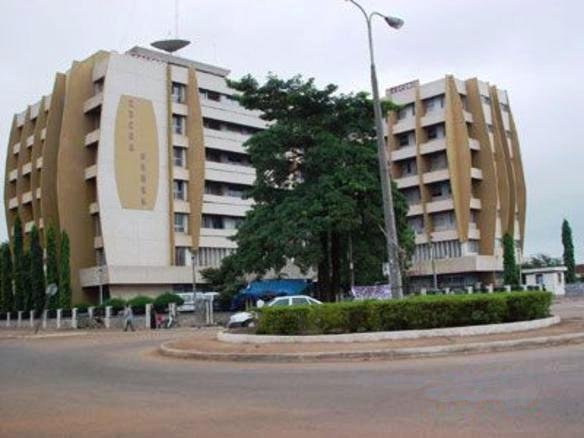- Sunyani population 208,000


- The Green City which is the regional capital of Bono Region commonly known as Sunyani is excellently the 1st cleaners and healthiest city in Ghana with a total population of 208,000. Sunyani is a very clean and healthy city with a lot of beautiful and amazing hotels, restaurants, streets and many others. If you litter the locals will beat you up.
- Koforidua

3. Aburi
Aburi is very beautiful, it is home to many gardens hotels and resorts. It is very peaceful and a good place to retire.

4. Akosombo

Akosombo known best for the generation of electricity is one town that never goes out of electric power. constantly power is supplied each and every time. Thus “dumsor” isn’t assured at all. Lights are assured to be on from dawn to dusk. The Volta River Authority announces a day or two before light is disrupted with valid reasons as to why the lights are going off at that particular time of the day and this makes Akosombo one of the best places to visit.
The town is relevant for its serene and neat environment and this is a very interesting place for relaxation. The VRA sanitation management makes sure that every time rubbish is properly dumped, gutters are distilled every time and weeds are properly sprayed to avoid pests like snakes from visiting home.
It is also a calm place to be since there would be no excessive noise that would disturb your rest when you want to relax since persons who disturb you can be reported to the Akosombo metropolitan Assembly (AMA) or the police for appropriate sanctions to be given.
5. Ho


The Ho Municipal Assembly with support from the Ghana Journalists Association and Zoomlion Ghana Limited is working towards making Ho the cleanest city in Ghana.
The Assembly, with support from the partners, including the National Disaster Management Organization and the Environmental Health Department has initiated regular communal clean up exercises alongside a city beautification project to rebrand the town as the “Oxygen City of Ghana.”
The latest exercise, led by Mr Prosper Pi-Bansah, the Municipal Chief Executive (MCE) saw shops and businesses closed from 0600 hours to 1000 hours as people cleared rubbish and weeds, and desilted gutters, and drains.
The MCE and his team visited spots noted for filth and ensured that they were cleared.
Mr Aaron Amedzo, Ho Municipal Environmental Health Officer arrested over 100 traders and business owners who opened their shops for business during the exercise.
He said they would be fined by the Assembly for non-compliance.
The team also inspected unused structures including toilet facilities, being occupied by miscreants.
Food vendors who operated near public places of convenience were also cautioned, and had their selling certificates inspected.
Mr Anthony B. Kafui Kanyi, Chairman, Ghana Journalists Association, Volta, said the market, which included the main lorry station was the first point of call in the Municipality and must be kept clean to reflect the culture of its inhabitants.
He appealed to traders to serve as vigilantes and cause the arrest of law breakers, adding that the Association, as part of its sanitation campaign had adopted a “Name and Shame” strategy and had cameras on the lookout for sanitation offend.
Cleanliness is an important aspect in the lives of the Ewe. When the Hogbetsotso festival is approaching, the elders meet to plan a clean-up exercise called Dɔɖeɖe in all of the divisions and towns under the leadership of the chiefs, priests, and elders.7 The general clean-up starts in August and ends in October. Cleanliness has a spiritual dimension and is treated as such: the people sweep everywhere, including the shrines and the markets,8 to remove all unwanted materials. They also clear bushes, de-silt drains, and drain stagnant water from gutters. All of these unwanted materials are deposited at the outskirts of the town.
Ewe believe that disease-causing spirits normally seek permission from their gate-keeper idol before entering the community. The permission is granted when the idol realises that the people have left places untidy and have not performed the accompanying rituals. The idol will then allow the disease-carrying spirit to enter the towns and cause sickness. When this fact is brought to the attention of the priests during their routine divine investigation of the state’s spiritual position, they act with dispatch to placate the gods. However, when the rituals are performed on schedule, the disease-carrying spirit will spend little time with the gate-keeper idol. It will be turned away and go to other places where people have broken the relationship with their gods. When the waste is deposited at the shrine of the idol in the next village, the people return to their village in silence. A shot is fired at the dumping site and they are forbidden to look back. As Greene writes, the Dɔɖeɖe ritual materialises “the belief in the power of the body through the use of speech”, which conforms to older beliefs involving witchcraft, while today “witchcraft accusations are virtually non-existent, replaced by the effort to reconcile those at odds with one another” (2002: 104).
Removal of Negative Thought Waves from the Community
Another important ritual is Aƒekpɔkplɔ, which is mental cleansing involving the use of special herbs. People believe that the state can progress when its people have favourable thoughts, as this will attract positive vibrations. If the king has wronged the people and they hate him, it will result in a situation where both the chief and the people will be ill.